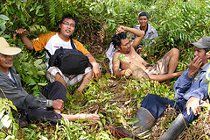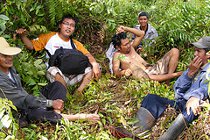Carbon offsets and market mechanisms for REDD financing opposed at COP16
Bolivia, backed by Brazil, has voiced concern regarding the financing of Reducing Emissions for Deforestation and Degradation (REDD), asking that any deal made in Cancun does not constitute the use of carbon offsetting.

 Bolivia, backed by Brazil, has voiced concern regarding the financing of Reducing Emissions for Deforestation and Degradation (REDD), asking that any deal made in Cancun does not constitute the use of carbon offsetting.
Bolivia, backed by Brazil, has voiced concern regarding the financing of Reducing Emissions for Deforestation and Degradation (REDD), asking that any deal made in Cancun does not constitute the use of carbon offsetting.
Governments locked in negotiations at the 16th Conference of Parties (COP16) in Mexico are eager to finalise an agreement on REDD in the remaining hours of the conference, which closes today (10th December 2010). However progress is being restricted due to a perceived lack of safeguards needed to guarantee rights for indigenous peoples and forest protection, and disagreements on how money for REDD will be mobilised.
Indigenous peoples, environmental organisations and social movements firmly support Bolivia and other governments on the need to secure protection for forests and forest dependent people without allowing developing countries to continue burning fossil fuels in exchange for forest protection. During COP16 they have opposed the decision that REDD will constitute the establishment of market mechanisms or the use of offsets for financing.
Canada and Australia on the other hand are pushing for the inclusion of markets and flexible mechanisms for financing, as this would mean they could avoid any emissions reductions at home.
The text under discussion now contains three options on finance, with the third being a compromise involving further discussion of the implications of different financing sources during the next year in hope of reaching a decision by COP17 in South Africa. Discussions include the effect that different options have on the effectiveness of REDD in protecting forests, forest dependent people and the environment as a whole.
The resolution of scientific disputes over how to measure and monitor the amount of carbon captured in trees, as well as growing political consensus on the need to reduce emissions as quickly and cost-effectively as possible, have meant that the role of forests in mitigating climate change has increasingly gained credence.
However, some groups believe that carbon mechanisms are being exploited. Simon Counsell, Executive Director of Rainforest Foundation UK said: "The draft text has been gutted of any language that would oblige tropical countries to respect environmental concerns or local peoples' rights. The stage seems set for the scheme that was intended to protect tropical forests to now become a feeding frenzy for corrupt and mismanaged countries to subsidise their oil palm, plantation and logging industries. It's an extremely dark day for the global environment."
According to a 2009 report from Ecosystem Marketplace, 'State of the Forest Carbon Markets 2009', only a narrow band of forestry offsets were recognised under the Kyoto Protocol. "In 2009, the Copenhagen Accord explicitly stated the need to develop mechanisms that would reward sustainable land-use practices that capture carbon in trees," states the report.
Transactions of forest carbon credits are on the rise, with the 2009 report recounting a total volume of 20.8 million tonnes of CO2 transacted in the global forest carbon market from 226 projects. Various stances clearly exist on carbon offsetting and market based mechanisms and the UN climate talks will involve listening to all opinions in the hope that an agreement can be reached for the text regarding REDD financing.
Kate Dooley, Forest Campaigner at Forest Ecosystems Research Network (FERN) said: "It's clear we are not ready here in Cancun for a decision on financing for REDD. We are already seeing the negative environmental and social impacts around the world from carbon trading, and a serious discussion on the implications of extending this to forests is urgently needed. We call on the EU as a whole to extend the leadership they are displaying in their fight for stronger safeguards and to fight for an open discussion of the financing options, without highlighting carbon markets as UK and Dutch governments would like to."
On 2nd December 2010 in Cancun, the UN-REDD programme launched its new publication "Perspectives on REDD+". One of the most commendable aspects of REDD+, and the programmes that implement it, is its endeavour to consider all stakeholders from indigenous communities to big business. The publication recognises that stakeholder engagement for REDD+ via the application of free, prior and informed consent (FPIC) has raised some complexities and controversy. The publication does not however discuss the controversy regarding financing of REDD activities.
Kate Horner, Policy Analyst at Friends of the Earth stressed the need to consider REDD financing. "Bolivia is advocating for real solutions that will protect the forests and ensure that developed countries honor the commitments to solve the problem they created," she said.
Discussions will continue in Cancun until the conference closes today (10th December 2010). If an agreement is not reached, discussions will continue throughout the year in the hope that a solid decision will be reached in South Africa in 2011.
Author: Marianna Keen | Climate Action
Image: Anak Tenda/ Flickr






